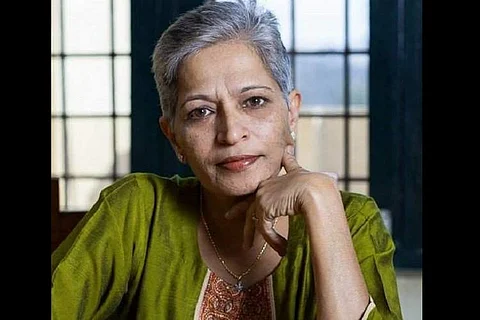

BENGALURU: Upholding the sanction accorded to invoke Karnataka Control of Organised Crime (KCOC) Act against the accused in journalist Gauri Lankesh murder case, the Principal City Civil and Sessions Court dismissed an application seeking their discharge from the offences punishable under the law.“There is a prima facie case for framing charges for the offences under IPC, Indian Arms Act and KCOC Act. Accordingly, the application filed by the accused seeking discharge from those offences is dismissed. There are materials to frame charges for the offences,” Judge Shivashankar B Amarannavar said.
It has come as setback for the 14 accused — Amol A Kale of Maharashtra, Parashuram Ashok Wagmore of Vijayapura, Ganesh Miskin (Hubballi), Amith Ramachandra Baddi (Hubballi), Amit Degwekar (Maharashtra), Bharat Kurane (Belagavi), Suresh H L (Tumakuru), Rajesh D Bangera (Madikeri), Sudhanva Gondalekar (Maharashtra), Sharad (Maharashtra), Vasudev Bhagwan Suryavanshi (Maharashtra), Sujith Kumar (Shivamogga), Manohar Dundeppa Yadave (Vijayapura) and Srikanth Jaganath Pangarkar (Maharashtra).
In its judgement dated December 20, 2019, the court noted that Kale, Degwekar, Bangera and Shard were allegedly involved in the murder of progressive thinker Dr Narendra Dabholkar. Kale is also accused of being involved in the murder of progressive thinker Govind Pansare. The court said it is clear that the police commissioner applied his mind before according sanction to prosecute the accused under the provisions of KCOC Act. Therefore, the application seeking discharge from the offences under the provisions of KCOC Act deserves to be dismissed, it said.
The accused had contended that no more than one chargesheet has been filed against them in the preceding 10 years of the crime and therefore KCOC Act could not be applied. The provisions of the law were invoked perhaps with orders from political quarters to harass them, they had said. There was no organised crime syndicate to execute the crime for pecuniary benefits, the accused had claimed.
They had also contended that the sanction had been accorded on the basis of the perception that there existed an organised group which intended to create a ‘Hindu Rashtra’, but it failed to explain how the objective of establishing it would amount to insurgency.
The Special Public Prosecutor contended that the objective of the organised crime syndicate was to achieve “Hindu Rashtra” by means of violence and thereby it promoted insurgency. “Since Gauri Lankesh was expressing her views which were inimical to ideology of the organised crime syndicate, the accused jointly hatched a criminal conspiracy to kill her.... Therefore, the act of the organised crime syndicate of the accused was to promote insurgency”, the SPP argued. Gauri had been killed in Bengaluru on September 5, 2017.